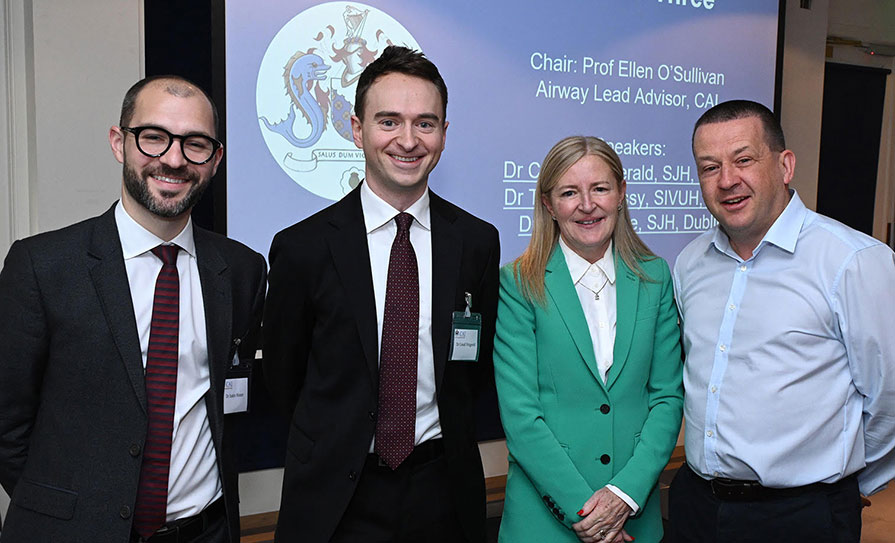The Joint Committee on the Eighth Amendment of the Constitution has just published its final report on the status of abortion in Ireland. Last week, the Committee voted in favour of repealing the Amendment and allowing unrestricted abortion up to 12 weeks.
A referendum on repealing the Eighth Amendment is now due to take place in 2018, and thus the legal situation around abortion access in Ireland will potentially alter significantly in the coming years.
While most of the focus has been understandably on the care provided to pregnant women and the impact of the Amendment on them, the three-month sitting of the Committee also highlighted a number of challenges and concerns faced specifically by doctors.
If there are to be changes to the legal framework governing the provision of abortion services in Ireland, the relevant medical regulatory and training bodies will have much work to do.
A spokesperson for the Medical Council told the <strong><em>Medical Independent </em></strong>(<strong><em>MI</em></strong>) that it currently provides guidelines on abortion in its <em>Guide to Professional Conduct and Ethics for Registered Medical Professionals — 8th Edition</em>. The relevant section is paragraph 48. These guidelines reflect the current legal framework provided by the Protection of Life during Pregnancy Act 2013. But this would change to meet any legislative changes in the future.
“Any update to Medical Council guidance would be considered in light of any changes to the legislation as a result of a referendum,” the Council spokesperson told <strong><em>MI</em></strong>.
<h3><strong>Unions </strong></h3>
With differing views among doctors, a referendum on abortion may put medical representative bodies in a somewhat tricky position. When asked directly if it would like the Eighth Amendment replaced, and if so by what, the IMO said its priority is seeking “absolute” legal clarity for doctors.
“As is the case across the community and among other professionals in the health sector, individual doctors hold different, often strongly-held views on matters like abortion where issues of personal morality, professional ethics and the law co-exist — often in the most complex and challenging circumstances,” an IMO spokesperson told <strong><em>MI</em></strong>.
“However, doctors and medical professionals have additional responsibilities and concerns in relation to such issues because they need to have absolute clarity around the legal position in which they operate and they need to have assurance about their ability to act in line with their conscience in a manner which respects their own views, while also respecting the views and wishes of the relevant patients and the legal environment in which they operate.”
But the IMO said it hopes that the debate in the coming months is “informed” and “compassionate”.
“It is now clear that through the proposed referendum on the Eighth Amendment, the people of this country will debate these issues once again in the near future,” said the spokesperson.
“For its part, the IMO hopes for a compassionate, informed debate which leads to clarity around the legal context in which doctors can make various decisions and which facilitates the right of individual doctors to act in line with their conscience, confident that alternative, legally-sound medical support will be available for the patient in question.”
In contrast, the IHCA declined to comment on <strong><em>MI</em></strong>’s queries regarding the future of the Eighth Amendment and how the situation currently impacts consultants.
“The IHCA has not commented on the Eighth Amendment at all. The Association of Obstetrics have taken the lead on that,” a spokesperson for the Association told this newspaper.
The NAGP had not replied to <strong><em>MI</em></strong>’s queries by the time of going to press.
<h3><strong>Exceptions</strong></h3>
There was substantial medical evidence delivered to the Committee from doctors working in a variety of fields, from general practice to obstetrics, on the topics of maternity services, crisis pregnancies, foetal abnormalities, abortion and contraception.
During its work, the Committee discussed the evidence around the possible provision of abortion services in a number of specified situations; one of these was pregnancy as a result of rape.
Towards the end of October, Committee members discussed this issue with a number of relevant experts, including Dr Maeve Eogan, Consultant Obstetrician and Gynaecologist at the Rotunda Hospital, Dublin.
Dr Eogan, who is also Clinical Director of the National Sexual Assault Treatment units (SATUs), outlined that while pregnancy after rape is infrequently encountered in those who attend SATU services, the extrapolated rape-related pregnancy rate is 5 per cent. Dr Eogan told the Committee that this estimate results from a three-year survey of over 4,000 women regarding the prevalence and incidence of rape and related physical and mental health outcomes.
Dr Eogan’s detailed evidence and subsequent questions and answers session seemed to suggest that there may be serious practical and possible ethical challenges if pregnancy as a result of rape was made one of the circumstances when it comes to allowing wider access to abortion in Ireland, as favoured by the Committee.
“Yes, this is true,” Dr Eogan told <strong><em>MI </em></strong>earlier this month.
“The first point is that there is no definitive ‘test’ that can conclusively confirm that rape has occurred,” she said.
“Secondly, most of us can only imagine how stressful it must be to be subjected to sexual violence, but imagine the emotional roller coaster and additional stress that must ensue if one also becomes pregnant as a result.
“We know from the SAVI [Sexual Abuse and Violence in Ireland] publication, as well as other international research, that very many people never tell anyone about sexual violence, or they may only disclose it many years after the incident,” she added.
“While the SATUs and allied services exist to provide prompt, holistic and responsive care to people who disclose sexual crime, it is not appropriate to mandate that women who are pregnant after sexual violence would be obliged to report the details and circumstances of this incident to An Garda Síochána or another regulatory body prior to being ‘approved’ for termination of pregnancy.”
Therefore, in her capacity as SATU Clinical Director, is Dr Eoghan concerned that if pregnancy after rape becomes one of the criteria allowing for access to abortion, could it complicate the delicate work carried out by SATU staff across Ireland?
“As the prolonged discussion at the Joint Committee on the Eighth Amendment of the Constitution highlighted, it is very difficult to see how legislation can provide a special provision for termination of pregnancy on the grounds of rape — but within the SATU services we are committed to providing individualised, person-centred services, and if there was some way we could be of assistance, we would aim to do so,” replied Dr Eogan.
“It must be emphasised that emergency contraception is very effective in preventing pregnancy.
“Therefore, as I said to the Committee, in addition to the other health, forensic and societal benefits of reporting sexual crime, in terms of pregnancy prevention it is imperative that people are encouraged and enabled to disclose acutely in order that they can receive appropriate care, including emergency contraception.”
Giving evidence to the Committee in October Dr Peter Boylan, Chair of the Institute of Obstetricians and Gynaecologists also addressed the issue of pregnancy as a result of rape.
“Pregnancy as a result of rape could be dealt with in a straightforward way by legislating for the legal prescription of the abortion pill…Pregnancy tests are now so sensitive that they are positive just before a missed period and so the pills would be 99 per cent successful if taken within the first eight weeks,” said Dr Boylan in his evidence to the Committee.
“There is no diagnostic test to confirm rape, so I strongly recommend that a woman who has undergone the trauma of rape should not be forced to ‘prove’ rape if she chooses to terminate a resulting pregnancy. Women should be taken at their word — hardly a revolutionary concept,” he maintained.
<h3><strong>Abortion pill </strong></h3>
The issue of abortion pills, currently illegal in Ireland, was raised a number of times during the medical evidence provided at the Committee.
The HPRA detains medicines containing the abortion agents misoprostol and mifepristone, however a spokesperson for the Authority told <strong><em>MI </em></strong>that the trend in recent years “indicates a gradual reduction” in the seizing of these pills.
According to figures provided by the Authority to this newspaper, in 2014, a total of 1,017 tablets were detained; of these, 972 contained misoprostol and 45 contained mifepristone. In 2015, 850 tablets were detained; of these, 739 contained misoprostol and 111 contained mifepristone, while last year, 536 tablets were detained; of these, 436 contained misoprostol and 100 contained mifepristone.
“The HPRA, in conjunction with Revenue Customs and An Garda Síochána, continues to monitor for unauthorised supplies of prescription medicines to the public,” continued the spokesperson.
“Such products pose a risk to public health, as there can be no guarantee as to their safety, quality or efficacy. In addition, we would be concerned about self-medication in the absence of appropriate prescribing and support from a registered medical practitioner.”
However, if the legal ban on these pills in Ireland was to be lifted in the coming years, would it take long for the HPRA to approve them?
“EU law requires that member states take all appropriate measures to ensure that the procedure for granting a marketing authorisation for a medicine is completed within a maximum of 210 days after the submission of a valid application,” explained the HPRA spokesperson.
<h3><strong>Unworkable</strong></h3>
Dr Boylan told the Committee that he believed that the Eighth Amendment is currently “unworkable”, partly because of medical advances with such pills.
“When it [the Eighth Amendment] was enacted 34 years ago, neither the world-wide web nor the abortion pill had been invented,” he told Committee members.
“I believe that the forthcoming referendum on the Eighth Amendment should put a simple binary question to the electorate for or against repeal. Legislation is the responsibility of the Oireachtas, not the people. On repeal of the Eighth Amendment, Irish law on termination of pregnancy would continue to be governed by the Protection of Life During Pregnancy Act and there would be no legislative vacuum pending further legislation.
“In the meantime, women in Ireland will continue to access services in the UK or elsewhere in Europe, or access abortion pills illegally.”
In May a report in the <em>BMJ </em>found that 95 per cent of Irish women surveyed who used the abortion pill in conjunction with a telemedicine service reported successfully ending their pregnancy without any need for surgical intervention or any medical assistance.
<h3><strong>Criminalisation </strong></h3>
Many of the medical experts who gave evidence to the Committee expressed concerns over abortion-related criminal sanctions currently hanging over doctors.
This legal pressure on doctors was emphasised by Dr Rhona Mahony, Master of the National Maternity Hospital, Holles Street, during her evidence to the Committee in October.
“I believe there is a need to decriminalise,” she told Committee members. “A complex medical decision is being made and I am not aware of any other area of medicine where people are charged with making complex medical decisions under the shadow of a custodial sentence of 14 years,” she added.
Speaking on the same day as Dr Mahony, Prof Fergal Malone, Master of the Rotunda Hospital in Dublin and Chairman of the RCSI’s Department of Obstetrics and Gynaecology, echoed his colleagues’ comments on the legal challenges faced by doctors.
“The current legislative status of termination of pregnancy in Ireland poses significant practical challenges for obstetricians when faced with a prenatal diagnosis of fatal or complex foetal abnormalities,” said Prof Malone during his evidence.
“Another challenge is the threat of imprisonment for staff…. There is a lack of clarity among some doctors on whether they may have a vulnerability to such a conviction if they are involved in any way in the management of a patient who has a pregnancy termination in another jurisdiction.”
Therefore, Prof Malone suggested that the Committee “might consider supporting the decriminalisation of pregnancy termination in the setting of foetal abnormalities”, considering the “practical challenges” facing obstetricians and maternity hospitals in Ireland.
He provided figures to the Committee showing that in 2016, 55 patients from the Rotunda travelled to the UK to undergo a pregnancy termination following a prenatal diagnosis of foetal abnormalities.
Sixty women attending services at Holles Street travelled to the UK for termination of pregnancy in the context of foetal anomaly in 2016.
The Committee last week voted in favour of abortion for fatal foetal abnormalities, but not for non-fatal abnormalities.
<div style=”background: #e8edf0; padding: 10px 15px; margin-bottom: 15px;”> <h3>The ‘get out’ clause? Conscientious objection</h3>
Another issue that arose often during the medical evidence to the Committee was the role of so-called ‘conscientious objection’.
A Medical Council spokesperson told MI that its current guidance on ‘conscientious objection’ is found in its Guide to Professional Conduct and Ethics for Registered Medical Professionals in paragraph 49. The section notes that “you may refuse to provide or to take part in the provision of lawful treatments or forms of care which conflict with your sincerely-held ethical or moral values”.
But it also notes that if a doctor holds a conscientious objection to a treatment, they must “inform the patient that they have a right to seek treatment from another doctor and give the patient enough information to enable them to transfer to another doctor to get the treatment they want”.
Speaking during his evidence in October, Prof Fergal Malone said that “the issue of conscientious objection is a valid one and we would generally always accept that”.
“In large hospitals, such as the Rotunda, the Coombe and the National Maternity Hospital, I would be confident that we would always have sufficient numbers of personnel available that, even if an individual doctor chose for personal reasons not to participate in a case, we would be able to provide care for the patient.”
However, Prof Malone did raise concerns about possible challenges faced in some of the smaller hospitals in the country.
Dr Meabh Ní Bhuinneain, Obstetrician and Gynaecologist, Mayo University Hospital, during her evidence in October noted “not all termination services will occur in the hospital sector”.
“In time, if abortion is liberalised in Ireland, early first-trimester termination with medical management will occur in the community,” she told Committee members.
“Therefore, the access to practitioners is possibly more streamlined in many areas around the country. If there are clusters of conscientious objectors that limit the geographical access for women and girls to services, the Medical Council is very clear at the moment — it will revise again in response to legislation — that the duty of care continues. Trying to arrange a transfer and access is part of that duty of care.
“A conscientious objector must have a very sincere belief in the ethical dilemma and be conflicted with it. It is not just a convenient opt-out by the professional. The testing of conscientious objection may become part of the assessment of competence and become a training issue.”
During her evidence, Dr Karena Hanley of the ICGP noted that: “A doctor has an ethical obligation not to allow his or her personal moral standards influence the treatment of a patient.
“If a doctor has strong views and is a conscientious objector, he or she must explain that to the patient and must make the names of other doctors available. That is very clear guidance from the Medical Council.”
</div>
<h3><strong>GPs </strong></h3>
The ICGP also appeared before the Committee, where its representatives Dr Brendan O’Shea, Director of the Postgraduate Resource Centre, and Dr Karena Hanley, National Director of GP Training, outlined the impact of crisis pregnancies on women and detailed the support and services, within legal restrictions, that GPs provide.
“Abortion is a divisive, difficult and polarising topic. Indeed, Irish general practitioners have debated this theme, and similarly to the broader population, we have witnessed conflicting opinions, concerns and beliefs among GPs.
“The constitutional criminalisation of abortion in Ireland has made this a more difficult issue to discuss in public. However, crisis pregnancy is a reality facing Irish women.
“Many Irish women choose to access abortion services, which we must deal with as a society. The Eighth Amendment clearly raises difficult ethical and moral issues for the public and healthcare providers,” reads the College’s written submission to the Committee.
Some Committee members raised concern that the medical evidence presented overwhelmingly leaned towards repeal of the Eighth Amendment, and two pro-life medical experts, in psychiatry and paediatrics, decided to decline their previously-accepted invitations to appear before the Committee.
<h3><strong>Planning </strong></h3>
So what next?
The Department of Health for one is looking at a future where the Eighth Amendment is possibly repealed.
In his evidence to the Committee in November, the Department’s Chief Medical Officer Dr Tony Holohan told members “pending a decision on the policy direction, the Department of Health is working with the Office of the Attorney General and the Department of the Taoiseach to explore and research the Constitutional and policy issues involved. This is so that as much preparation as possible can be drawn upon if a referendum on the matter is called next year.”
In contrast to the Department, the HSE is not working on any legal, policy or resource scenarios for the possible repeal of the Eighth Amendment, an Executive spokesperson told <strong><em>MI</em></strong>, adding that “it would be premature to plan for this scenario, considering change to legislation is pending”.
The HSE provides free post-abortion medical check-ups and maintains the websites www.positiveoptions.ie and www.abortionaftercare.ie.
“The HSE Sexual Heath and Crisis Pregnancy Programme currently funds 15 crisis pregnancy counselling services,” said the spokesperson.
<h3><strong>Debate </strong></h3>
In terms of taking positions in the planned referendum, earlier this year Irish group Doctors for Choice released a statement to mark the five-year anniversary of Savita Halappanavar’s death, making its stance clear.
“As doctors, we say ‘never again’. As doctors, we say ‘not in our name’.
“Savita Halappanavar died five years ago this week when 17 weeks pregnant. She died as a direct result of being denied a termination of pregnancy — a termination that was medically indicated and requested by her when she knew she was going to have a miscarriage that couldn’t be prevented. This is the blunt and unpalatable truth. If she had been medically managed, as she would have been in every other European and developed country, she would be alive today and we wouldn’t need to know who she is. Tragically, we do, and her family and the Irish people must bear those scars.
“Access to abortion is a health issue. The medical profession stands indicted for inactivity, while the maternal health of women in Ireland is compromised. The restrictive Eighth Amendment must be repealed and legislation enacted to provide and regulate comprehensive abortion provision in Ireland.”
Doctors for Life also made its position clear earlier this year, following the Citizens Assembly vote that abortion should be permitted in the State in a wide range of circumstances.
“The Eighth Amendment provides an excellent constitutional framework for ensuring equality for all our patients before the law. Doctors for Life will continue to defend the right to life of every human being in the womb, regardless of disability or prognosis. We would appeal to all healthcare professionals to consider the implications for their patients, both born and unborn, if it were to be legally permissible in this country to directly end the life of a person because they require extra care or because they are terminally ill or [it was] simply inconvenient.”
Whatever happens with the referendum, the battle lines are now being drawn for a divisive and difficult campaign, with the medical profession a key player.
<div style=”background: #e8edf0; padding: 10px 15px; margin-bottom: 15px;”> <h3 class=”Pa13″>Abortion statistics for women in Ireland</h3> <p class=”Default”>According to the Irish Family Planning Association (IFPA), between January 1980 and December 2016, at least 170,216 women and girls travelled from the Republic of Ireland to access abortion services in another country.
<p class=”Default”>In 2016, 3,265 women and girls gave Irish addresses at UK abortion services. “This number is an underestimation, as not all women will provide their Irish addresses at UK abortion clinics. Some women also travel to other countries, such as the Netherlands,” according to IFPA.
<p class=”Default”>Twenty-five legal abortions took place in Ireland in 2016, under the Protection of Life during Pregnancy Act 2013, according to the Department of Health. Eight procedures were arising from a risk of physical illness, one arising from a risk from suicide and 16 from emergencies arising from physical illness.
<p class=”Default”>In 2015, the number of abortions carried out under the Act was 26.
</div>










Leave a Reply
You must be logged in to post a comment.